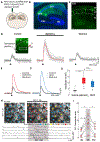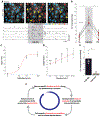A vicious cycle of β amyloid-dependent neuronal hyperactivation
- PMID: 31395777
- PMCID: PMC6690382
- DOI: 10.1126/science.aay0198
A vicious cycle of β amyloid-dependent neuronal hyperactivation
Abstract
β-amyloid (Aβ)-dependent neuronal hyperactivity is believed to contribute to the circuit dysfunction that characterizes the early stages of Alzheimer's disease (AD). Although experimental evidence in support of this hypothesis continues to accrue, the underlying pathological mechanisms are not well understood. In this experiment, we used mouse models of Aβ-amyloidosis to show that hyperactivation is initiated by the suppression of glutamate reuptake. Hyperactivity occurred in neurons with preexisting baseline activity, whereas inactive neurons were generally resistant to Aβ-mediated hyperactivation. Aβ-containing AD brain extracts and purified Aβ dimers were able to sustain this vicious cycle. Our findings suggest a cellular mechanism of Aβ-dependent neuronal dysfunction that can be active before plaque formation.
Copyright © 2019 The Authors, some rights reserved; exclusive licensee American Association for the Advancement of Science. No claim to original U.S. Government Works.
Conflict of interest statement
Figures





Comment in
-
Early network dysfunction in Alzheimer's disease.Science. 2019 Aug 9;365(6453):540-541. doi: 10.1126/science.aay5188. Science. 2019. PMID: 31395769 No abstract available.
-
Glutamate perpetuates amyloid-β-dependent neuronal hyperactivity.Nat Rev Neurol. 2019 Oct;15(10):558-559. doi: 10.1038/s41582-019-0256-3. Nat Rev Neurol. 2019. PMID: 31462750 No abstract available.
References
-
- De Strooper B, Karran E, The Cellular Phase of Alzheimer’s Disease. Cell 164, 603–615 (2016). - PubMed
Publication types
MeSH terms
Substances
Grants and funding
LinkOut - more resources
Full Text Sources
Other Literature Sources
Medical
Molecular Biology Databases

